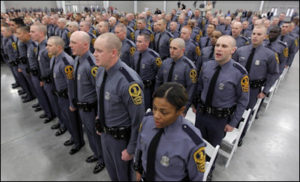
Virginia State Police graduates. Lawmakers propose a big increase in starting salaries. Photo credit: InsideNova.com.
Virginia State Police troopers would receive a $7,000 pay raise — a 22.3% boost for starting salaries — under a budget proposal that also would provide a 3% pay raise for all state employees, reports the Richmond Times-Dispatch. The dramatic pay hike comes in response to deteriorating morale and a surge in state trooper departures.
Is such a big pay raise justified in the midst of a budget crunch in which lawmakers are forced to cut other programs?
Clearly, the state police have a massive problem. In November, the agency had 257 vacancies in a sworn force of 2,148, according to the Daily Press. Over the past few years, the state police averaged six departures monthly, reports the T-D. That number increased to 13 per month in last year and shot up to 22 in just the first 20 days of 2017.
By my back-of-the-envelope calculations, paying 2,150 officers an extra $7,000 each will cost the state about $15 million per year. That is a considerable sum. However, if the pay increase staunches the loss of manpower, it will be offset by a reduced training costs. The Times-Dispatch article notes that it costs the City of Richmond about $100,000 to get a recruit trained and on the street. Assuming that the cost to the state police is roughly comparable, and assuming the pay hike reduces the number of departures back to the pre-crisis norm of six per month, the state police will need to train 80 to 90 fewer troopers each year. That would represent a savings of $8 million to $9 million. (I have made several assumptions here, which undoubtedly can be refined, but you get the gist.)
Thus, while the $15 million departmental pay raise will not fully pay for itself through reduced turnover, the adjusted cost when taking training expenses into account will be considerably lower.
Are there other ways to offset the expense? Presumably, some state police functions are more critical than others, and some offer more law enforcement bang for the buck than others. Could the troopers be relieved of low value-added tasks that soak up manpower?
For example, lawmakers enacted a policy last year as part of a bipartisan compromise on gun control, in which state police conduct background checks at gun shows. Implementing that policy cost $300,000 annually to pay for three full-time civilian positions, as the Times-Dispatch reports here. In its first six months, the program resulted in only one person being denied the purchase of a weapon at 41 Virginia gun shows. The man was wanted for failing to appear before a grand jury in September. Was that one detention worth $300,000?
Six months may not be sufficient time to fairly judge the effectiveness of the program. But that’s the kind of question we need to be asking. Instead of stroking the state police a $15 million check, legislators should ask the top brass to enumerate all the tasks state troopers are called upon to perform. How much manpower do those jobs require? What value do they provide? Can we reduce the number of troopers on payroll without harming public safety?
It seems clear that we need to increase Virginia State Police salaries, and equally clear that the state will recoup some of that expense through reduced training expenditures. However, we should not assume that the only way to pay for higher salaries is to pump more money into the agency. Perhaps we can scale back tasks of marginal value. Unfortunately, I see no indication in the news coverage of this issue that anyone has even considered that alternative.


